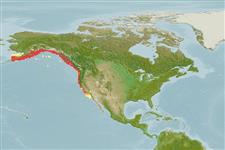Common names from other countries
(كوسه ها و سپرماهيان) (sharks and rays) >
Rajiformes (Skates and rays) >
Rajidae (Skates)
Etymology: Beringraja: Named for the Bering Sea, though to be the origin of the two species in this genus.; binoculata: From the Latin 'bi' meaning two and 'oculata' meaning eyed - referring to the arrangement of pigment on the pectoral fin bases (Ref. 6885).
More on author: Girard.
Environment: milieu / climate zone / depth range / distribution range
بوم شناسي
دريايي نزديك كف زي; تغييرات عمق 3 - 800 m (Ref. 6793), usually 3 - 110 m (Ref. 2850). Temperate; 61°N - 31°N, 165°W - 117°W (Ref. 55279)
North Pacific: Glubokaya Bay, Cape Navarin, and Stalemate Bank to Cedros Island, Baja California, Mexico.
Length at first maturity / Size / Weight / سن
Maturity: Lm ?, range 130 - ? cm
Max length : 244 cm TL جنس نر / بدون خواص جنسي; (Ref. 2850); common length : 180 cm TL جنس نر / بدون خواص جنسي; (Ref. 2850); بيشينه وزن گزارش شده: 91.0 kg (Ref. 2850)
خارهاي باله پشتي (کل) : 0; خارهاي باله مخرجي: 0. Dorsal fins well back on tail, small; caudal and anal fins absent; pectorals broad, attached to snout and incorporated with body; pelvic fins large, moderately concave on free margins (Ref. 6885). Posterior sides of tail with a small fleshy keel on either side (Ref. 6885).
Largest skate in North America (Ref. 2850). Feed on crustaceans and fishes (Ref. 6885). Oviparous. Distinct pairing with embrace. Young may tend to follow large objects, such as their mother (Ref. 205). Young hatch at 18-23 cm TL (Ref. 114953). Eggs are oblong capsules with stiff pointed horns at the corners deposited in sandy or muddy flats (Ref. 205). Egg capsules are 22.8-30.5 cm long and 11.0-19.4 cm wide (Ref. 41249, 41300, 41357). Pectoral fins utilized for human consumption (Ref. 2850). Marketed fresh and frozen; eaten fried and baked (Ref. 9988).
Life cycle and mating behavior
Maturities | تولید مثل | Spawnings | Egg(s) | Fecundities | توزاد ( لارو)
Up to 7 embryos per egg case (Ref. 2850). Oviparous, paired eggs are laid. Embryos feed solely on yolk (Ref. 50449). Distinct pairing with embrace. Young may tend to follow large objects, such as their mother (Ref. 205).
McEachran, J.D. and K.A. Dunn, 1998. Phylogenetic analysis of skates, a morphologically conservative clade of elasmobranchs (Chondrichthyes: Rajidae). Copeia 1998(2):271-290. (Ref. 27314)
وضعيت در فهرست قرمز IUCN (Ref. 130435)
CITES (Ref. 128078)
Not Evaluated
خطر برای انسان ها
Harmless
استفاده انسانی
ماهي گيري – شيلات: تجاري; آكواريوم: آکواریوم عمومی
ابزارها
گزارش های ويژه
بارگيری XML
منابع اينترنتي
Estimates based on models
Preferred temperature (Ref.
115969): 3.4 - 10.8, mean 6.8 (based on 512 cells).
Phylogenetic diversity index (Ref.
82804): PD
50 = 0.5156 [Uniqueness, from 0.5 = low to 2.0 = high].
Bayesian length-weight: a=0.00302 (0.00141 - 0.00645), b=3.24 (3.07 - 3.41), in cm Total Length, based on LWR estimates for this (Sub)family-body shape (Ref.
93245).
Trophic level (Ref.
69278): 3.9 ±0.64 se; based on food items.
جهندگی (Ref.
120179): پايين ، كم, كمينه زمان لازم براي دو برابر شدن جمعيت 5/4 – 14 سال (Fec assumed to be <100).
Fishing Vulnerability (Ref.
59153): Very high vulnerability (90 of 100).
